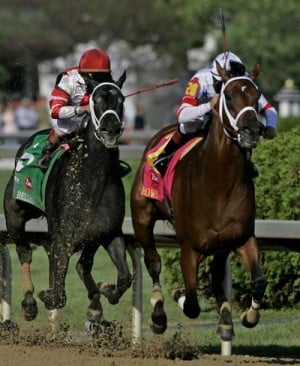And who is questioning?
Derby belies racing’s reality
Today’s Run for the Roses revives a spectacle that keeps the Kentucky Derby among America’s premier sporting events.
On this weekend’s editorial pages, we look at another side of horse racing. The grandeur and tradition of the Kentucky Derby belies an industry struggling with too many tracks, too few horses and a dwindling fan base. The future is cobbled by a mish-mash of state laws and regulations, and an onslaught of gaming competition.
The same company that owns Churchill Downs also owns Arlington Park, which, in turn, owns the Quad-City Downs —a track in name only. The overgrown racing surface would be unsafe for horses. The clubhouse is in shambles. The backstretch barns were demolished and the land sold years ago.
The property has declined so much, in 2010 the owner sought and won a 37 percent reduction in assessed tax value.
Yet Arlington Park officials have formally pitched reviving horse racing at the Quad-City Downs as part of a statewide plan to add slot machines to tracks. A bill under discussion in the Illinois Legislature would authorize 350 slots at the Downs and more for Illinois’ five functioning race tracks. The company expects slots to generate at least $15.4 million annually in gross gaming revenue from slots at the Downs. About $2 million of that annually would be reserved for “new purses to be paid at the Quad-City Downs.”
Arlington Park representative Thom Serafin shared proposals about the Downs slot expansion with the Times April 24. The proposal calls for a $14.5 million makeover of the Downs intertrack betting facility into a slot casino, but makes no mention of the track.
After three weeks of inquiries, no one at Arlington Park would provide information on the class of racing, length of a meet or any cost estimate for restoring the track and grandstand, and rebuilding the backstretch.
While it is unclear if the track ever could accommodate horses again, it seems abundantly clear that it shouldn’t.
The racing industry already has too many tracks and too few horses. Attendance is dwindling at almost every track. Off-track betting is dropping even more quickly. The Downs intertrack wagering handle is down 37.4 percent since 2007. And the Downs seems to be doing better than most others. Illinois’ busiest off-track betting in Oakbrook Terrace, reports a 62.4 percent decline in wagering over the same period.
Clearly, horse racing has problems that legislation alone cannot solve.
Illinois’ proposal banks on thousands of new slot machines to generate the revenue racing fans cannot.
But Arlington Park’s own assumptions about this slot machine windfall are bound to come up short. Joseph Weinert, the analyst hired by Arlington Park to estimate the impact, told the Times his company did not figure in the certainty of 50,000 new, competing slot machines coming to taverns and restaurants throughout Illinois. That gambling expansion “wasn’t incorporated into our analysis,” Weinert told the Times. “We don’t know if there will be 50 bars and resaturants within a five minute drive of Q-C Downs that have electronic gaming devices.”
We don’t know either. But we do know Illinois is counting on revenue from those tavern games to pay off construction loans authorized in 2009.
Illinois’ racino bill is counting on not only thousands of new slot machines at the state’s five operating tracks and the Quad-City Downs. The same bill counts on $200 million in tax revenue from a brand new Chicago casino, new casinos in Danville, Rockford; another in suburban Chicago Lake County and still another in south suburban Chicago.
The Illinois Lottery is counting on newly approved online sales to pull even more from Illinois gamblers.
That leaves Illinois counting on gambling for an awful lot.
Before the Legislature adds thousands of slots to race tracks, perhaps lawmakers should count again.
Read more: http://www.qctimes.com/news/opinion/editorial/derby-belies-racing-s-reality/article_2712311e-9676-11e1-93d9-001a4bcf887a.html#ixzz1u73WugtB
The consequences of this failed scheme can be seen HERE.




No comments:
Post a Comment